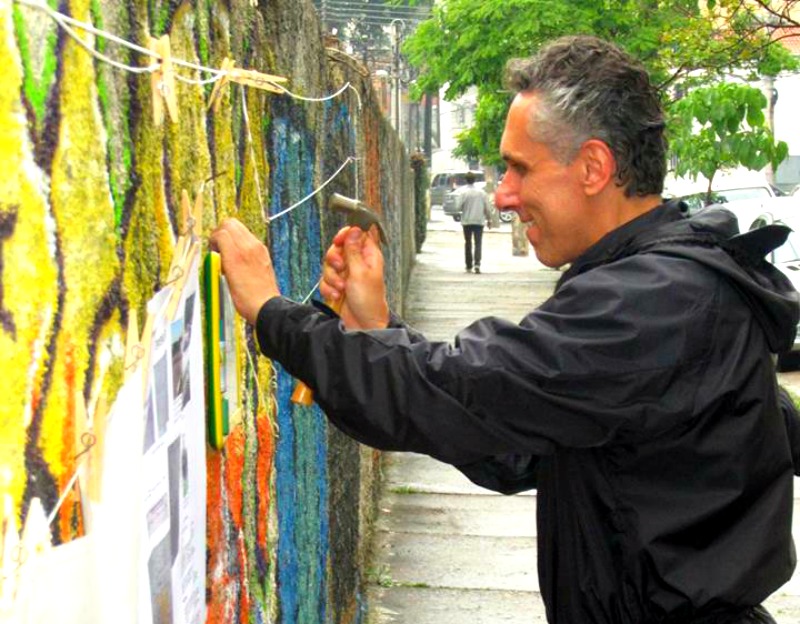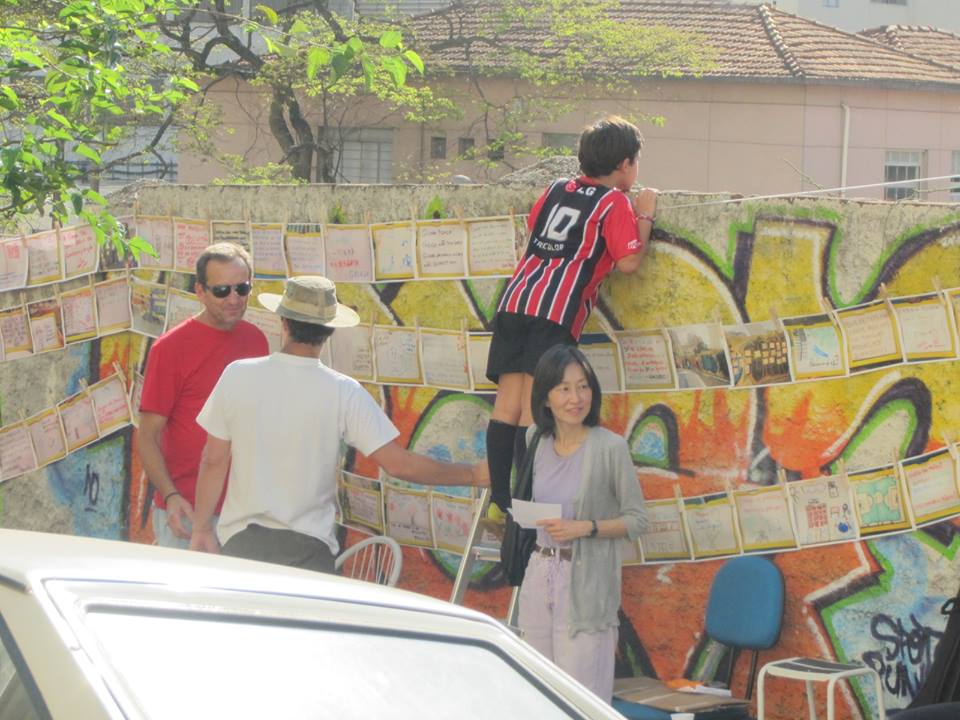
Ricardo Fraga hanging the pictures people drawn at the wall in Vila Mariana. Photo: ARTICLE 19/Facebook
In 2013, Global Voices told the story of Ricardo Fraga, an agricultural engineer gagged by a Brazilian court from speaking out on the streets and the Internet against the construction of a high-rise residential complex in a vacant lot in his neighborhood in São Paulo. Since then, for 728 days his right to protest has remained legally suspended.
He is under a restraining order and can't come within 1 kilometer of the high-rise complex. His Facebook page, “O outro lado do muro – Intervenção Coletiva” (The Other Side of the Wall – Collective Intervention), is forbidden to post any content related to Mofarrej Co., the contractor which owns the lot and who is responsible for the complex's construction. If he disobeys, he must pay a fee of 10,000 reais (around 3,300 US dollars).
To mark the two years since the gag order, international NGO Article 19, which defends freedom of expression and has been following the case since the beginning, has organized a protest in front of the wall March 6, 2015. Fraga won't be able attend the rally, but protesters will be wearing a mask with his face to remember that #FragaQuerPostar (#FragaWantsToPost).
It all started in 2011. For a few months that year, Fraga — a public servant who has worked for more than 20 years on environment and urbanism at São Paulo's City Hall — had a weekend ritual: he grabbed his kids’ white board, a few pens, a ladder and walked to the surrounding wall of a vacant lot located in São Paulo's neighborhood of Vila Mariana. Once there, Fraga invited people to climb the ladder, peek on the other side of the wall, think about what they would like to see there and draw whatever they had imagined. Soon the drawings became a Facebook page and a social movement.
He told Global Voices:
O movimento começou com o objetivo de promover uma reflexão sobre a forma como a cidade é apropriada, o modelo de verticalização que vem se impondo, suas consequências, o ideal de cidade que imaginamos e sobre o por que a sociedade pouco se mobiliza na preservação de espaços tão significativos.
The movement started with the goal of encouraging a reflection on how the city is appropriated, the verticalization model that is being imposed and its consequences, the ideal city that we imagine and why society doesn't mobilize itself for the preservation of such meaningful spaces.
But Fraga soon had other company at the wall: Mofarrej started sending real estate agents to the site. A few weekends went by with no major problems, each man in one corner — until one year later, one of the agents approached him with a threat that Fraga “did not know what could happen to him”.
In 2013, the company decided to file a suit, asking for the suspension of Fraga’s protests and the Facebook page and for 100,000 reais (about 33,000 US dollars) compensation.
The next day, without hearing the defendant's side, a judge issued a restraining order against Fraga, forbidding him from coming within 1 kilometer of the wall, and demanded the movement’s page be removed from Facebook. The judge ignored the demand for material compensation, but imposed the 10,000-real fine for every breach of the orders.
Fraga filed an appeal in São Paulo State Court, with the support of Article 19 and a petition with 5,000 signatures supporting him. On May 15, 2013, the court upheld the judge's decision, but reduced the restraining order from 1 kilometer to one block and ruled that Fraga did not need to take down the Facebook page, but should delete all content related to Mofarrej Co. and not post any in the future.
But in September 2014 the first judge handed down his final decision: the restraining order went back to 1 kilometer. Fraga filed another appeal and now waits for a final ruling from São Paulo State Court.
NGO Article 19 says the decision violates article 19 of the UN International Covenant on Civil and Political Rights and makes Fraga into “one of the first people prohibited from protesting online by the Brazilian judiciary”. On their website, they argue that the decision didn't respect the “three-part test” (three provisions recommended respected when limiting freedom of expression: to be provided by the law, to have a legitimate aim supported by international law and to be necessary and proportional in a democratic state):
Caso o teste das três partes tivesse sido observado, a restrição contra a liberdade de Ricardo não teria sido concedida visto que tal restrição não se encontra prevista em lei e o interesse econômico de comercialização dos lotes pela empresa não esta acima do interesse publico concretizado na garantia da liberdade coletiva de manifestação. Em outras palavras, a decisao constitui limitação desproporcional e ilegitima ao exercício do direito de protesto de Ricardo e o direito a informação de toda a sociedade.
If the three-part test was observed, this restriction against Ricardo's freedom wouldn't have been handed down since it's not provided by the law and the company's economic interest in real estate commercialization is not above the public interest crystallized in the guarantee of collective freedom of expression. In other words, this decision is disproportional and denies both Ricardo of his right to protest and society of its right to information.
Guilherme Ravaglia Perisse Duarte from Advogados Ativistas (Activist Attorneys) told Global Voices that the case also sets a dangerous precedent:
A decisão é assustadora, pois submete os Direitos Fundamentais à liberdade de expressão, reunião pacífica e livre associação, garantidos pela Constituição Federal, ao suposto direito da construtora de vender os imóveis, independentemente da informação.
Utilizando essa lógica seria justificável proibir as pessoas, ou a mídia, de criticar qualquer produto, sob o argumento de que a empresa tem o direito de vendê-lo.
Como seria a sociedade capitalista se a Publicidade fosse a única forma de informar? Eu imagino um mundo de obesos comendo fast-food para emagrecer e é esse o mundo da decisão que proíbe o Fraga de falar, ainda bem que é um caso isolado!
The decision is frightening because it subjects fundamental rights such as freedom of speech, peaceful public gathering and free association, assured by the Federal Constitution, to the contractor's alleged right to sell real estate, regardless of the information.
By this logic it would be justifiable to forbid people, or the media, to criticize any product, under the argument that the company has the right to sell it.
How would capitalist society be if advertising was the only way to inform? I imagine a world of obese people eating fast-food to lose weight and this is the world of the decision forbidding Fraga to speak. Fortunately it’s an isolated case.
If this street were mine…
The largely residential neighborhood of Vila Mariana has more than 300,000 residents. It’s close to Parque Ibirapuera, one of the largest green areas in São Paulo's concrete jungle. It's the neighborhood Fraga chose to raise his kids. He still remembers how sometime between the 1990s and the 2000s children used to go climb that wall to play and grab fresh fruits from the trees in the vacant lot. He also remembers the time when one of the Mofarrej’s family members decided to cultivate vegetables at the site and sell them to the neighbors.

The wall of protest. Photo: ARTICLE 19/Facebook
And he also remembers the rumor of a river passing through the lot:
(Um amigo engenheiro) disse que havia fortes indiciados que naquela área passasse um rio, o Boa Vista. Como no processo de licenciamento não constava nenhuma referência, fomos atrás de mapas antigos e descobrimos um de 1905 e outro de 1913 que dava indícios da existência do curso do rio. Com estes dois mapas encaminhei memorando como servidor ao secretário da secretaria do verde e do meio Ambietne municipal que suspendeu o licenciamento para averiguação.
(An engineer friend) told me there was strong evidence that a river ran through the area, the Boa Vista river. As the complex's licensing process did not make any reference to it, we started to search old maps, and found out one from 1905 and another from 1913 indicating the existence of the river. With these two maps, I issued a memo, as a public servant, to the Green and Environmental Municipal Secretariat who suspended the license to verify it.
After conducting an extensive geoprocessing study and finding new maps at the City Hall, Fraga found out that the information about the river was true. Twice the environmental license for construction was suspended, and twice the enterprise of 162 apartments and 650 parking spots — with estimated prices between 2.5 and 5 million reais (between 1 and 2 million US dollars) — came back.
So, when he had to hear the sentence on May 15, 2013, it was hard to hold in the tears:
He said:
Sou tb advogado e, assim que comecei a escutar a decisão do agravo impetrado, percebi que ela continuaria violentando-me, impedindo-me de postar na rede mundial de computadores e de impedir-me d ir ao local, mesmo após termos contestadas todas as acusações existentes na petição inicial da empreendedora.
I’m also a lawyer and, as soon as I started to hear the decision on the filed grievance, I realized it would continue violating me, stopping me from posting on the Internet and of going to that place, even after we contested all the accusations of the company’s initial petition.
But even with the prohibition, the Facebook page “O outro lado do muro” continues documenting and debating gentrification and occupation movements in the city of São Paulo.
Mofarrej Co’s three towers of apartments are almost concluded and ready to be delivered.








1 comment
Suzanne Goldenburg, U. S. environmental correspondent to The Guardian newspaper wrote on 5 August 2013:
“Two young children in Pennsylvania were banned from talking about fracking for the rest of their lives under a gag order imposed under a settlement reached by their parents with a leading oil and gas company.
The sweeping gag order was imposed under a $750,000 settlement between the Hallowich family and Range Resources Corp, a leading oil and gas driller. It provoked outrage on Monday among environmental campaigners and free speech advocates.
The settlement, reached in 2011 but unsealed only last week, barred the Hallowichs’ son and daughter, who were then aged 10 and seven, from ever discussing fracking or the Marcellus Shale, a leading producer in America’s shale gas boom.
The Hallowich family had earlier accused oil and gas companies of destroying their 10-acre farm in Mount Pleasant, Pennsylvania and putting their children’s health in danger. Their property was adjacent to major industrial operations: four gas wells, gas compressor stations, and a waste water pond, which the Hallowich family said contaminated their water supply and caused burning eyes, sore throats and headaches.”
And lest we think that Brazil, alone, favors commercial interests over free speech, here’s a blurb from Wikipedia:
“Food libel laws, also known as food disparagement laws and informally asveggie libel laws, are laws passed in 13 U.S. states that make it easier for food producers to sue their critics for libel. These 13 states include Alabama,Arizona, Colorado, Florida, Georgia, Idaho, Louisiana, Mississippi, North Dakota, Ohio, Oklahoma, South Dakota, and Texas.[1] Many of the food-disparagement laws establish a lower standard for civil liability and allow for punitive damages and attorney’s fees for plaintiffs alone, regardless of the case’s outcome.[2]
These laws vary significantly from state to state, but food libel laws typically allow a food manufacturer or processor to sue a person or group who makes disparaging comments about their food products. In some states these laws also establish different standards of proof than are used in traditional American libel lawsuits, including the practice of placing the burden of proof on the party being sued.”
Viva le Revolucion! Viva la Raza!